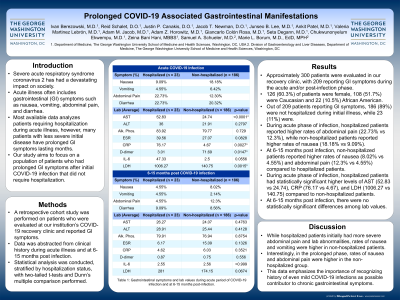Tuesday Poster Session
Category: Functional Bowel Disease
P3380 - Prolonged COVID-19 Associated Gastrointestinal Manifestations
Tuesday, October 24, 2023
10:30 AM - 4:00 PM PT
Location: Exhibit Hall

Has Audio

Ivan Berezowski, MD
George Washington University School of Medicine and Health Sciences
Washington, DC
Presenting Author(s)
Ivan Berezowski, MD1, Adam Jacob, DO2, Giancarlo Rosa, MD2, Jacob T. Newman, DO3, Justin Canakis, DO1, Adam Horowitz, MD2, Junseo B. Lee, MD1, Ankit Patel, MD1, Valeria Martinez Lebron, MD1, Reid Schalet, DO2, Seta Degann, MD1, Chukwunonyelum Ekwempu, MD1, Zeina Bani Hani, MBBS1, Samuel A. Schueler, MD2, Marie L. Borum, MD, EdD, MPH4
1George Washington University School of Medicine and Health Sciences, Washington, DC; 2George Washington University Hospital, Washington, DC; 3George Washington University, Washington, DC; 4George Washington University Medical Center, Washington, DC
Introduction: COVID-19 is characterized by respiratory manifestations but often includes gastrointestinal (GI) symptoms. Most available data analyze patients requiring hospitalization. However, patients with less severe initial disease may have prolonged GI symptoms. We aimed to analyze and compare acute and prolonged GI symptoms in patients with COVID-19 who did and did not require initial hospitalization.
Methods: An IRB-approved, retrospective cohort study was performed on patients with persistent symptoms after acute COVID-19 infection. Data were abstracted from clinical history prior to COVID-19 diagnosis, during acute COVID-19, and the post-acute phase. Statistical analyses were conducted for numerical variables by comparing lab values stratified by hospitalization status. Mann-Whitney two-tailed t-tests, and Dunn's multiple comparison tests were completed. Percentages of participants reporting "Yes" or "No" were compared for categorical variables, using the same stratifications as for numerical variables.
Results: Out of approximately 300 patients evaluated in our COVID-19 Recovery Clinic, 209 reported GI symptoms. Of those reporting GI symptoms,126 (60.3%) were female, 108 (51.7%) were White and 22 (10.5%) were African-American. A majority (89%) were not hospitalized during acute infection. Among non-hospitalized patients, 18.18% reported nausea, 6.42% reported vomiting and 12.3% reported abdominal pain during the acute phase, compared to 9.09%, 4.55% and 22.73%, respectively, of hospitalized patients. Hospitalized patients had initially higher levels of aspartate transaminase (AST) and inflammatory marker compared to non-hospitalized patients, but levels were similar in the prolonged phase. In the prolonged phase, non-hospitalized patients had higher rates of nausea (8.02%) and abdominal pain (12.3%) compared to hospitalized patients (4.55% and 4.55%) (Table 1).
Discussion: We identified 209 patients who described GI symptoms during acute COVID-19 infection, or in the prolonged phase up to 15 months after. While hospitalized patients initially had more severe abdominal pain and lab abnormalities, rates of nausea and vomiting were higher initially in non-hospitalized patients. Interestingly, in the prolonged phase, rates of nausea and abdominal pain were higher in the non-hospitalized group. These data emphasize the importance of recognizing history of even mild COVID-19 infections as possibly contributing to chronic gastrointestinal symptoms.
Disclosures:
Ivan Berezowski, MD1, Adam Jacob, DO2, Giancarlo Rosa, MD2, Jacob T. Newman, DO3, Justin Canakis, DO1, Adam Horowitz, MD2, Junseo B. Lee, MD1, Ankit Patel, MD1, Valeria Martinez Lebron, MD1, Reid Schalet, DO2, Seta Degann, MD1, Chukwunonyelum Ekwempu, MD1, Zeina Bani Hani, MBBS1, Samuel A. Schueler, MD2, Marie L. Borum, MD, EdD, MPH4. P3380 - Prolonged COVID-19 Associated Gastrointestinal Manifestations, ACG 2023 Annual Scientific Meeting Abstracts. Vancouver, BC, Canada: American College of Gastroenterology.
1George Washington University School of Medicine and Health Sciences, Washington, DC; 2George Washington University Hospital, Washington, DC; 3George Washington University, Washington, DC; 4George Washington University Medical Center, Washington, DC
Introduction: COVID-19 is characterized by respiratory manifestations but often includes gastrointestinal (GI) symptoms. Most available data analyze patients requiring hospitalization. However, patients with less severe initial disease may have prolonged GI symptoms. We aimed to analyze and compare acute and prolonged GI symptoms in patients with COVID-19 who did and did not require initial hospitalization.
Methods: An IRB-approved, retrospective cohort study was performed on patients with persistent symptoms after acute COVID-19 infection. Data were abstracted from clinical history prior to COVID-19 diagnosis, during acute COVID-19, and the post-acute phase. Statistical analyses were conducted for numerical variables by comparing lab values stratified by hospitalization status. Mann-Whitney two-tailed t-tests, and Dunn's multiple comparison tests were completed. Percentages of participants reporting "Yes" or "No" were compared for categorical variables, using the same stratifications as for numerical variables.
Results: Out of approximately 300 patients evaluated in our COVID-19 Recovery Clinic, 209 reported GI symptoms. Of those reporting GI symptoms,126 (60.3%) were female, 108 (51.7%) were White and 22 (10.5%) were African-American. A majority (89%) were not hospitalized during acute infection. Among non-hospitalized patients, 18.18% reported nausea, 6.42% reported vomiting and 12.3% reported abdominal pain during the acute phase, compared to 9.09%, 4.55% and 22.73%, respectively, of hospitalized patients. Hospitalized patients had initially higher levels of aspartate transaminase (AST) and inflammatory marker compared to non-hospitalized patients, but levels were similar in the prolonged phase. In the prolonged phase, non-hospitalized patients had higher rates of nausea (8.02%) and abdominal pain (12.3%) compared to hospitalized patients (4.55% and 4.55%) (Table 1).
Discussion: We identified 209 patients who described GI symptoms during acute COVID-19 infection, or in the prolonged phase up to 15 months after. While hospitalized patients initially had more severe abdominal pain and lab abnormalities, rates of nausea and vomiting were higher initially in non-hospitalized patients. Interestingly, in the prolonged phase, rates of nausea and abdominal pain were higher in the non-hospitalized group. These data emphasize the importance of recognizing history of even mild COVID-19 infections as possibly contributing to chronic gastrointestinal symptoms.
Disclosures:
Ivan Berezowski indicated no relevant financial relationships.
Adam Jacob indicated no relevant financial relationships.
Giancarlo Rosa indicated no relevant financial relationships.
Jacob Newman indicated no relevant financial relationships.
Justin Canakis indicated no relevant financial relationships.
Adam Horowitz indicated no relevant financial relationships.
Junseo Lee indicated no relevant financial relationships.
Ankit Patel indicated no relevant financial relationships.
Valeria Martinez Lebron indicated no relevant financial relationships.
Reid Schalet indicated no relevant financial relationships.
Seta Degann indicated no relevant financial relationships.
Chukwunonyelum Ekwempu indicated no relevant financial relationships.
Zeina Bani Hani indicated no relevant financial relationships.
Samuel Schueler indicated no relevant financial relationships.
Marie Borum: Takeda – Advisory Committee/Board Member, Speakers Bureau.
Ivan Berezowski, MD1, Adam Jacob, DO2, Giancarlo Rosa, MD2, Jacob T. Newman, DO3, Justin Canakis, DO1, Adam Horowitz, MD2, Junseo B. Lee, MD1, Ankit Patel, MD1, Valeria Martinez Lebron, MD1, Reid Schalet, DO2, Seta Degann, MD1, Chukwunonyelum Ekwempu, MD1, Zeina Bani Hani, MBBS1, Samuel A. Schueler, MD2, Marie L. Borum, MD, EdD, MPH4. P3380 - Prolonged COVID-19 Associated Gastrointestinal Manifestations, ACG 2023 Annual Scientific Meeting Abstracts. Vancouver, BC, Canada: American College of Gastroenterology.
